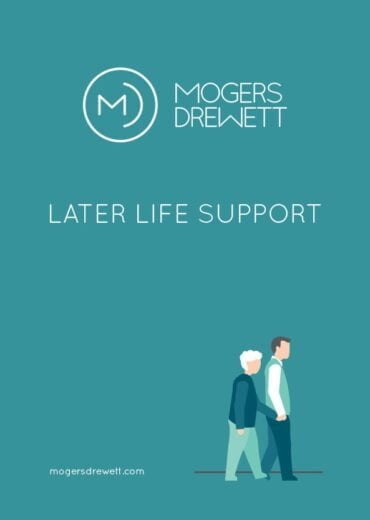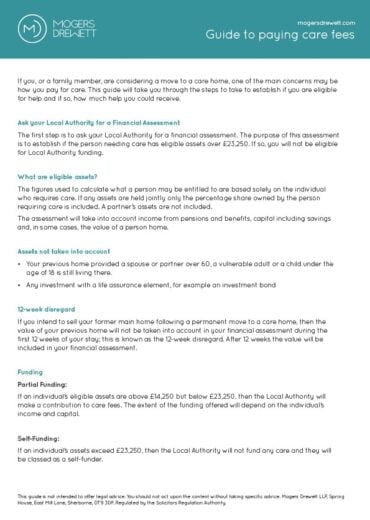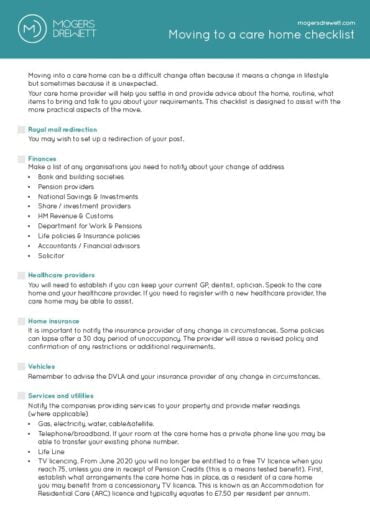Later Life Finance Planning
Introducing our Mogers Drewett Financial Planning team.
As a society, we are living longer, and as a result our finances have to work harder to be able to support us for longer. Balancing the desire to live life to the full whilst also planning to meet the costs of on-going care and protecting assets that will become the inheritance for our families is a challenge.
Our team of financial planners at Mogers Drewett Financial Planners (MDFP) holds a number of specialist qualifications in this field, including Membership of both The Society of Later Life Advisers and The Society of Trust & Estate Practitioners and work alongside our legal teams to provide a fully comprehensive and holistic range of advice specifically aimed at clients in later life.

Our later life services include:
Estate Planning
Estate Planning involves maximising the value of your estate and making sure your assets are passed on to loved ones either during your lifetime or on your death. Poor or no planning can at best substantially reduce the amount your loved ones (beneficiaries) receive or at worst compromise your own financial independence and security in later life. Our team of financial and legal experts will work with you to build a plan that is designed to avoid both these scenarios.
Funding ongoing care
Most families faced with a need for care in later life are concerned about the potential cost. Common questions include, if savings run out how will care be funded? will the family home need to be sold? and how do I protect my assets for my family to inherit? Our team of experts at MDFP specialise in advising people in later life, their families and any Attorneys or Deputies that might be acting on your behalf. We can guide you through the process advising you on the best options available to you, to plan for and meet the costs of care while still looking after your loved ones in the future.
Inheritance tax planning
Inheritance tax is the tax you pay on your possessions and money (your estate) if the value of your estate exceeds the tax allowances available. Taking action now to plan your affairs can mean that Inheritance tax can be completely avoided or reduced. Our combined legal and financial approach to inheritance tax planning is often a blend of tax efficient Will drafting, trust arrangements and investments to ensure the transfer of your estate to your loved ones is a tax efficient as possible.
Equity Release
Equity Release can provide a tax efficient regular income, a cash lump sum or a combination of the two for homeowners aged 55 and over. Equity release enables homeowners to access money that is tied up in their property without having to move or downsize. Equity release won’t be right for everyone and so it’s important to speak to equity release experts who can take you through the appropriate solutions based on your situation and your plans for the future.
Next steps: get in touch
Careful planning now for later life and care home funding is essential to ensure you enjoy the retirement to have worked hard for, so contact our financial planning team on: 01225 308333 or financialplanning@mogersdrewett.com and start your plan.
Mogers Drewett Financial Planning (MDFP) is a trading style of Centurion Wealth Management which is authorised and regulated by the Financial Conduct Authority (FCA). Registered in England and Wales Number 7001057. Registered Office: Channel Court, 8 Hill Road, Clevedon, Bristol, BS21 7NE
Meet the team
Frequently asked questions
The “equity” in your home is the difference between its value and any debts secured against it, such as a mortgage. Equity Release involves borrowing money against the security of your property to release funds without having to sell your house and downsize. This is a lifetime mortgage. To understand the features and risks, ask for a personalised illustration.
- Repaying debt – Including an interest only or endowment mortgage which is coming to an end, replace expensive credit cards or personal loads
- Maintaining or improving a lifestyle – by funding new cars, dream holidays or to provide some financial security when income is limited.
- Home improvements – including replacing roofs and windows, redecorating and extending.
- Funding private medical treatment
- Funding care costs
- Bank of mum and dad – to help your children buy their own property, fund private school or to give loved ones an early inheritance.
The main benefit is to avoid or reduce the amount of inheritance tax you pay to HMRC which results in you being able to leave more of your estate to your loved ones. It also allows you ensure that your assets are given to the people you choose after you have gone.
The care cap is the centrepiece of the government’s long-awaited reform of adult social care funding in England, due to come into force in October 2023. The £86,000 cap on care liabilities looks generous; however, it is not as simple as it looks, and a lot of people now incorrectly believe that they will not pay more than £86,000 for their later life care.
The cap only relates to ‘personal care’ costs and not costs for ‘hotel’ costs such as accommodation and meals. In addition, the care costs relate to the costs based on what the local authority believes is an appropriate fee, meaning if anyone selects a care home that charges above the average, then the extra costs will not count towards the cap.
For example: Someone in care paying £800 per week, where the ‘hotel’ costs amount to £250 and the local authority has deemed the appropriate weekly fee to be £600, the amount that counts towards the care cap is £350.
Based on the figure of £350 per week this means that the care cap would be reached in 245 weeks or 4.7 years. Using the example above, someone paying £800 per week for care who does remain in care for 4.7 years and reaches the care cap, the person in care will have contributed approximately £196,000 to their care to reach the cap.








